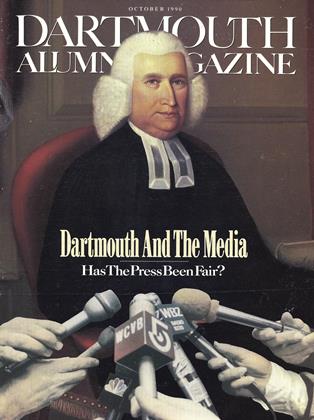1832
The state legislature passes a bill requiring all New Hampshire youths over 18 to perform military duty. Dartmouth students happily join the local militia. According to historian Ralph Nading Hill '39, however, they proceed to "dress inappropriately, misconstrue every command, step on each other's feet, all the while complaining loudly." The militia captain eventually gives up, and the state passes legislation allowing students to form companies of their own.
1834
Students form the Dartmouth Phalanx, a.k.a. the 23rd New Hampshire Regiment. The company earns a widespread reputation for its elegant uniforms, dignified manner, and perfection of its drills.
1861
Charles Lee Douglas '62 becomes the nation's first undergraduate to join the Union Army. Eventually 652 Dartmouth students will fight for the North, 44 for the South.
1916
An editorial in the Jack-O-Lantern denounces the faculty for granting three hours of credit for summer military training. The author is expelled, despite a protest petition that draws 1,000 signatures.
1918
In October, all undergraduates over 18 are enrolled in the newly established Student Army Training Corps. Fraternities are closed, dormitories are turned into barracks, and the Commons becomes an army mess hall. Peace is declared a month later.
1936
More than 1,000 students vote to eliminate compulsory military training. Concurrently, Palaeopitus asks the administration to offer a course on war.
1943
The insignia for the U.S. Army Air Corps' Dartmouth Unit depicts an Indian in war paint and headdress seated on a winged, propeller-driven beer keg.
1957
Dartmouth becomes the second college to offer mountain and winter warfare training. The Army ROTC runs a cooperative program with the Dartmouth Outing Club.
1966
Dartmouth hosts the 12th Conference of Army Mathematicians. Topics include "Solutions for Axisymmetric Shell Vibrations" and "A Time Distribution Model for Predicting Casualties."
1969
In May, 45 students are sentenced to 30 days in jail for occupying an administration building in protest of ROTC at Dartmouth. The students are granted permission to take their textbooks with them to study for final exams.
1990
Five years after it was reinstated, ROTC at Dartmouth is deactivated by the newly budget-conscious Pentagon. The news is met on campus with little fanfare.
Despite occasional lapses,Dartmouth studentshave taken militarytraining very seriously.
 View Full Issue
View Full Issue
More From This Issue
-
 Cover Story
Cover StoryDARTMOUTH IN THE MEDIA
October 1990 By Peter S. Prichard '66 -
 Feature
FeatureTHE FORFEIT
October 1990 By Ken Johnson '83 -
 Feature
FeatureUNDERPROMISE AND OVERDELIVER
October 1990 By William H. Davidow '57 -
 Article
ArticleDR. WHEELOCK'S JOURNAL
October 1990 -
 Class Notes
Class Notes1980
October 1990 By Michael H. Carothers -
 Article
ArticleProf's Choice
October 1990
Article
-
 Article
ArticleDartmouth Night
November 1943 -
 Article
ArticleHe Likes Rain
October 1952 -
 Article
ArticleRugby
DECEMBER 1958 By CLIFF JORDAN '45 -
 Article
ArticleThe Future Is Before Us
December 1978 By JAMES A. EPPERSON -
 Article
ArticleMedical School
May 1961 By PHILIP O. NICE, M.D. -
 Article
ArticlePRESIDENT RED SOX FAN
June 1936 By Robert P. Fuller '37

